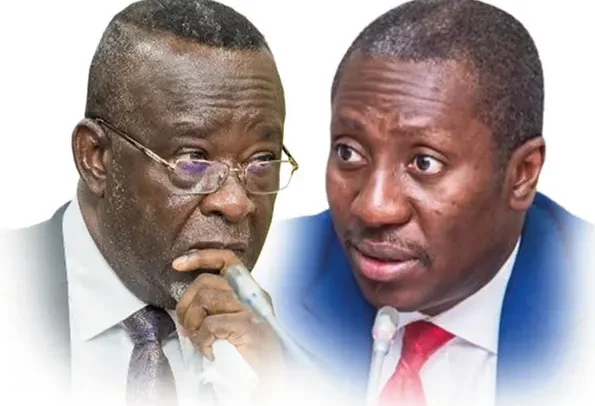Justice Paul Baffoe-Bonnie and Alexander Afenyo-Markin
The vetting of Chief Justice nominee, Justice Paul Baffoe-Bonnie, in Parliament yesterday was marred by controversy and drama, culminating in a boycott by the Minority Caucus after heated exchanges over their attempt to make preliminary comments.
The session, held by the Appointments Committee, began on a tense note when the Minority Leader, Alexander Afenyo-Markin, who is also the Ranking Member of the Committee, sought to make opening remarks outlining his side’s reservations about the process.
However, the Majority Leader, Mahama Ayariga, objected, insisting that the matter had already been dealt with in Parliament through an earlier motion and that the vetting was not a forum for political commentary.
Tensions escalated when Mr. Afenyo-Markin referred to Justice Baffoe-Bonnie as a “disputed Chief Justice nominee”, a description that immediately drew protests from the Majority side.
Mr. Ayariga challenged the characterisation, arguing that it prejudiced the process and demanded that the Minority Leader withdraw and apologise for the statement. Mr. Afenyo-Markin refused, accusing the Majority Leader of acting in bad faith and seeking to silence dissent.
The confrontation forced the Chairman of the Committee to suspend proceedings for nearly 30 minutes to restore calm.
When the sitting resumed, Mr. Afenyo-Markin announced that the Minority would abstain entirely from the vetting process in protest over what he described as a lack of transparency and fairness in the handling of the nomination and the earlier removal of former Chief Justice Gertrude Torkonoo.
“Be it known to you, Chairman, and to the Committee and the country that we, the Minority Caucus, hereby vote en-bloc to reject the nominee,” Mr. Afenyo-Markin announced.
“We would want to state on record that the Majority can proceed with the questions. We do not intend to proceed with any question. We are, however, registering in the strongest terms that we reject the nomination, and the records should reflect that the report of this Committee be a majority report,” the Effutu MP stated before leading his side to walk out.
This left only the Majority members of the Appointments Committee to continue the vetting.
Justice Baffoe-Bonnie, who currently serves as Acting Chief Justice, was nominated by President John Dramani Mahama to succeed Justice Torkonoo following her removal from office, a decision the opposition has repeatedly criticised as “a travesty of justice.”
Mr. Afenyo-Markin insisted that the committee responsible for her dismissal operated under “opaque circumstances” and accused the government of politicising the judiciary.
Despite the walkout, the Majority proceeded with the vetting, questioning Justice Baffoe-Bonnie on his appointment, custodial sentences, and the need to rebuild public confidence in the judiciary.
NPP’s Concerns
Meanwhile, the opposition New Patriotic Party (NPP) has expressed reservations over the nomination of Justice Paul Baffoe-Bonnie for the office of Chief Justice, warning that proceeding with the vetting amid ongoing legal disputes threatens Ghana’s constitutional order.
In a statement released immediately after the Minority’s boycott of the vetting, the party said its concerns are rooted not in partisan politics but in a commitment to constitutionalism, the rule of law, and the preservation of democratic institutions.
“Our position is rooted in a solemn duty to defend the 1992 Constitution of Ghana from any action that threatens its integrity and the delicate balance of powers,” the statement, signed by Justin Kodua Frimpong, General Secretary of the NPP, said.
The party highlighted that the removal of former Chief Justice Gertrude Araba Essaba Torkornoo is currently the subject of seven substantive legal suits pending before the Supreme Court, the High Court, and the ECOWAS Court of Justice.
According to the NPP, these cases raise fundamental questions regarding due process, natural justice, and the constitutional protections of judicial officeholders.
“It is a cardinal principle of constitutional governance that where the legitimacy of a foundational state action is directly challenged before a competent court, the political branches must exercise restraint until the judiciary has discharged its constitutional mandate to interpret the law,” the statement added.
The NPP also cited potential conflicts of interest concerning Justice Baffoe-Bonnie, noting that he presided over interlocutory proceedings in Assafuah v. Attorney-General, a case central to the legality of the Chief Justice’s office, and was part of the Supreme Court majority that allowed the removal process of Justice Torkornoo to proceed.
“This situation engages the timeless principle of nemo judex in causa sua, that no person shall be a judge in their own cause. The appearance of a conflict of interest is palpable and undermines public confidence in the impartiality of the judiciary and his stewardship,” the statement said.
The party further criticised the Mahama administration for moving forward with the nomination despite these pending cases, describing it as a pre-emptive assault on the judicial function.
Addressing Justice Baffoe-Bonnie, the NPP said that accepting the nomination under these circumstances represents “a gross and detrimental failure of judicial leadership”, emphasising that the judiciary’s independence requires restraint and principle.
The statement also warned the government to exercise its constitutional prerogative in appointments with fidelity to the law rather than political expediency, asserting that “political majorities are transient, but constitutional principles are eternal.”
By Ernest Kofi Adu, Parliament House


